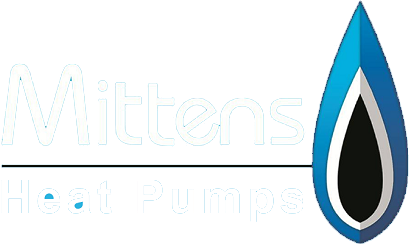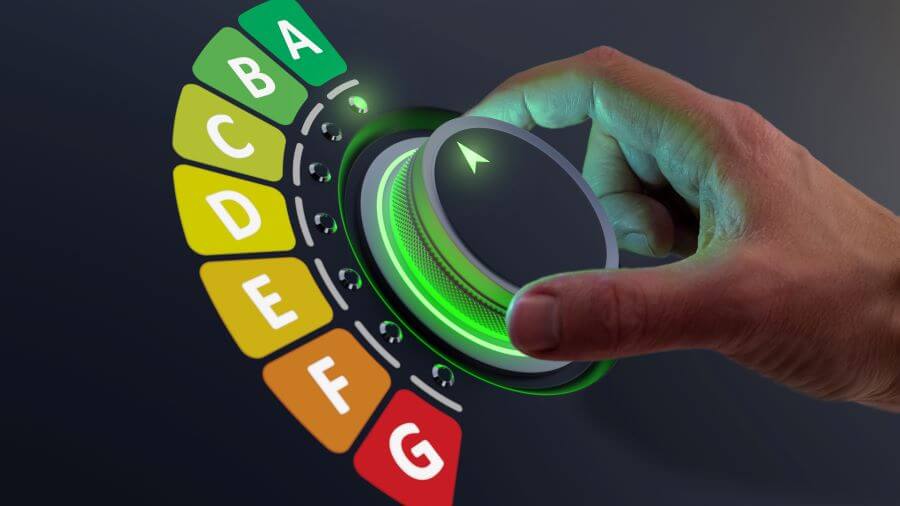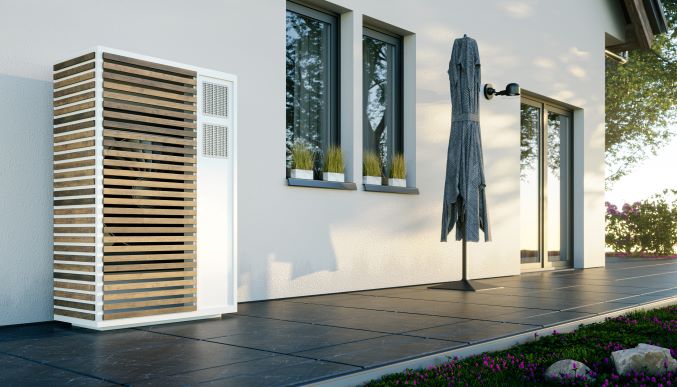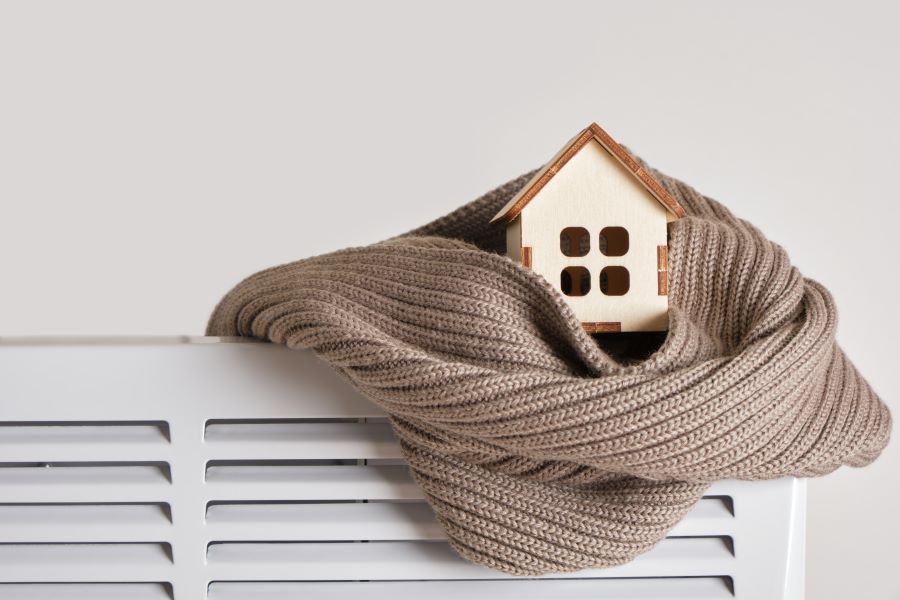Table of Contents
- 1 - Air Source Heat Pumps Explained
- 2 - What is an Air Source Heat Pump?
- 3 - How do Air Source Heat Pumps Work?
- 4 - Why are Air Source Heat Pumps Better than Boilers?
- 5 - How do Air Source Heat Pumps Compare to Ground Source Heat Pumps?
- 6 - Can Households in Cold Climates use an Air Source Heat Pump?
- 7 - Benefits of Air Source Heat Pumps
- 8 - Types of Air Source Heat Pumps
- 9 - How Long Do Air Source Heat Pumps Last?
Air Source Heat Pumps Explained
Imagine life without unwieldy LPG and oil or tanks, problematic refills and wasted space in the garden. This can be a fact with an air source heat pump, a sustainable solution to producing heat using the power of air and electricity.
If you want to reduce your heating costs and carbon emissions, an air source heat pump can give you three times more heat for each unit of electricity used to power it and adequate heat for your radiators or underfloor heating and hot water. Read on to find out more about air source heat pumps and their advantages so that you can know whether this may be the best choice for your home.
What is an Air Source Heat Pump?
An air source heat pump is a system for heating and cooling homes and commercial buildings. An air source heat pump is usually placed outside the building. The system extracts heat from the air and uses a heat pump to boost it to a higher temperature. The pump is powered by electricity but the heat it produces costs less than the electrical energy it uses. Like most heat pumps, air source heat pumps are also better for the environment, leaving less of an impact, and producing far fewer carbon emissions.
How do Air Source Heat Pumps Work?
An air source heat pump works by transferring heat extracted from the outside air to indoors so as to heat radiators through the wet central heating systems, providing hot water for the home or commercial property. The way they work is very similar to how a refrigerator works – the system works by extracting heat from outside and transferring it inside. During the summer, it extracts warm air from your home and takes it outside. The cooler air is then pumped back into your home and it thus also provides dehumidified air conditioning.
Why are Air Source Heat Pumps Better than Boilers?
Air source heat pumps are far more efficient than boilers. New high-performance boilers (LPG, gas, and oil) and biomass boilers have a much-improved efficiency of about and above 90%, with only minimal quantities of heat being lost through the flue.
On the other hand, the output of an air source heat pump can potentially achieve as much as 350% (or theoretically a performance coefficient of 3.5). This is because air source heat pumps operate by absorbing the heat which occurs naturally outside your home and bringing it indoors.
Air source heat pumps last longer than boilers. A traditional oil or gas boiler is expected to operate reliably for 8 to 12 years, as long it is serviced annually. Air source heat pumps have a longer lifespan and can operate for up to 25 years with adequate servicing, as they have fewer moving parts and fewer breakable parts. What is more, most air source heat pumps have 5-year warranties.
Air source heat pumps take up less space. Air source heat pumps are compact. Compared to traditional boilers, air source heat pumps require far less space.
Air source heat pumps are best suited for underfloor heating. Air source heat pumps operate much more effectively at lower temperatures than is the case with a conventional boiler system. This makes them more suited for underfloor heating systems or bigger radiators, which send out heat for longer periods of time at lower temperatures.
Air source heat pumps are greener than boilers. One of the main advantages of air source heat pumps is that, unlike a gas boiler, they do not produce carbon dioxide while in use. They need a limited amount of energy to work, but their high performance makes them even more eco-friendly.
If the power used to run the heat pump is produced by solar panels or wind turbines rather than coal, this is even much better because carbon emissions will then be zero.
How do Air Source Heat Pumps Compare to Ground Source Heat Pumps?
A ground source heat pump is more expensive to install. In most cases, you will spend more money installing a ground source heat pump upfront than an air source heat pump upfront. This is largely due to the additional outdoor components needed and the installation itself: to install a ground loop, contractors need to dig into your property for a ground source heat pump. This process involves bringing heavy machinery to your property for trench digging and piping installation. Installations for air source heat pumps are less labour-intensive and thus require less time. Installing an air source heat pump is as easy as hooking up an air conditioner.
Ground source heat pumps are 20% more efficient than air source heat pumps. Several experiments indicate that ground source heat pumps are usually about 20% more efficient than air source heat pumps. This is because heat is transmitted through water movement through the earth, and water has a higher capacity to retain heat relative to air.
The ground temperature is fairly fixed at a constant 10C to 130C throughout the year, so a ground source heat pump remains consistently efficient throughout the year, uninfluenced by seasonal changes.
Less maintenance is required for both ground source heat pumps and air source heat pumps. Assuming that the ground array has been fully assembled and tested without any water leakage, ground source heat pumps are like your freezer, as the unit itself does not even require any scheduled maintenance. The array should include antifreeze and a biocide to stop any growth of bacteria in the water.
An air source heat pump is equally robust and needs only regular inspections to ensure that the exterior airway and the coil surfaces are free of contaminants. Most heat pump makers provide lifetime warranties for their products if you enter into an ongoing servicing agreement.
Can Households in Cold Climates use an Air Source Heat Pump?
The answer is yes. In cold weather, an air source heat pump will still operate, but note that performance on the coldest days would be very low due to its outdoor deployment. That is because the amount of energy that can be transmitted to your home from an air source heat pump is highly dependent on outside atmospheric temperature, so if it decreases too far, the pump’s heat production drops, too. Fortunately, there are many heat pumps specifically designed for colder climates with high HSPF ratings, such as cold-climate air source heat pumps.
Cold-climate air source heat pumps are a new generation of heat pumps capable of performing in colder temperatures. They can be a cost-effective option for many homeowners across the UK to improve home comfort while delivering energy and cost savings. Cold-climate air source heat pump systems can be installed across a variety of climates in different types of homes.
Benefits of Air Source Heat Pumps
Installation of air source heat pumps (ASHPs) instead of more traditional heating and cooling technologies has several advantages. The benefits include:
- ASHPs are cheaper and faster to install than ground source heat pumps because you save the cost of installing a ground loop heat exchanger in the ground.
- ASHPs are cheaper than oil boilers to run and can be cheaper than gas boilers to run.
- ASHPs require less maintenance than heating systems which are based on combustion. They also have a longer life than boilers used for combustion.
- ASHPs combine heating and refrigeration systems into one. When you install an ASHP, you benefit from the heater and air conditioner in one system. This means you can reduce the costs and time associated with installing two different systems that serve separate purposes, as well as decrease the amount of physical space required for two single technologies.
- ASHPs operate relatively quietly compared with other heating and cooling technologies. This is especially true when you are using ductless mini-splits.
- ASHPs produce less carbon emissions. Unlike burning oil, LPG, biomass, or coal, ASHPs generate no carbon emissions on-site (when they are powered by a renewable source of electricity).
- ASHPs deliver one to three times the energy they consume. ASHP can help reduce your fuel bills, particularly if you replace older, inefficient heating and cooling systems.
Types of Air Source Heat Pumps
There are two major types of ASHPs:
- Air-to-water heat pumps.
- Air-to-air heat pumps.
Air-to-water Heat Pumps
Air-to-water heat pumps collect heat from the outside environment and pass it to a water-based device. The heat generated can be used for heating space or as a source of hot water for the home.
Air-to-Air Heat Pumps
Air-to-air heat pumps are heating systems that use outside air as the source of heat, and indoor air as the sink of heat. In order to allow cooling, the system can be reversed during the summer. These pumps extract outdoor heat and channel it through fans into your home.
Domestic Air Source Heat Pump Running Costs and Income
The installation of air source heat pumps is not the only cost involved. The monthly and annual cost of operating this type of heating system has to be taken into account. There is no fixed or definite cost because this will vary from property to property.
One air source heat pump can produce 3kWh of heat for every 1 kWh of electricity. For most UK homes the average annual demand is 12,000 kWh. 12,000 kWh (heat demand) / 3kW (heat production per unit of electricity) = 4,000 kWh of electricity. At 4,000 kWh of electricity at the cost of £0.13 per unit, the annual heating costs will be around £520.
Air source heat pumps have been proved to be the most popular system, with 8,000 households getting payments via the Renewable Heat Incentive (RHI) for this type of heat pump. An annual RHI income for the installation of air source heat pump is £1,302 for a 2-bedroom house.
Air Source Heat Pump RHI (Renewable Heat Incentive)
The RHI pays homeowners who sign up for the air source heat pump RHI. The estimation of the RHI payment for air source heat pumps takes into account the property’s heat demand and the seasonal output factor for that particular heat pump.
Your air source heat pump must be based in England, Wales or Scotland in order for you to be qualified to apply for RHI. Northern Ireland has its own RHI system. If your air source heat pump has been installed as part of a new build, eligibility for the RHI is very unlikely. To be eligible, the air source heat pump itself has to be new.
The heat pump can’t be an air-to-air heat pump as they are not supported by the scheme. To qualify, the air source heat pump must use a liquid for space heating. Your heat pump compressor must also be electricity-powered.
Air Source Heat Pump Maintenance
A high-quality and well-installed air source heat pump system should need very little maintenance and can be expected to last for at least 20 to 30 years. Installations require an annual inspection that can either be performed by the owner of the device or by a professional installer or technician.
Your installer or supplier will provide you with details of the specific maintenance specifications of your system as well as how to maximise the efficiency of your system. The following cleaning process should be carried out on your own:
- Clean coils and fans
- Clean or change filters
- Ensure that debris does not impede proper airflow
- Clean the supply and return registers.
How can I tell if an Air Source Heat Pump Would be Good for my Home?
Whether an air source heat pump is a suitable heating and cooling choice for your home or not is decided by four major factors: location, budget, property size, and your current heating and cooling system.
Air source heat pumps can work at a large temperature range but their performance can fluctuate depending on air temperature. Because of their higher efficiencies and reduced operating costs, air source heat pumps can save money in the long term; however, they usually require a higher initial cost than conventional heating and cooling systems. Air source heat pumps are ideal for most properties but some would be more suited for ground source heat pumps than others.
Well-insulated energy-efficient homes will generate the most savings with air source heat pumps because they will require less overall electricity to maintain warm or cool house temperatures. The installed heating and cooling system(s) in your home will affect how heat pumps from the air supply make sense, as well as how much you will save in the long run.
An air source heat pump would be a more reliable and cost-effective means to heat your home in certain cases. This applies particularly if your home is currently heated with oil or propane, and more so if your system is over 15 years old.
How Long Do Air Source Heat Pumps Last?
Air source heat pumps have a long service life and can be operational for up to 25 years with proper maintenance.
Are Air Source Heat Pumps Noisy?
Your air source heat pump will generate between 40-60 decibels from a distance of one metre, depending on the type of system that you have installed. This is roughly the same level as a bird call.
Noise should not be a significant concern with modern, high-quality air source heat pumps. If the air source heat pump is installed properly by a licensed installer, the system will create next to no noise.
Air Source Heat Pump Repair
Air source heat pump repair is something that may be required from time to time. There are common issues for air source heat pumps that may sometimes require attention. Many of these problems can be avoided by making sure that you choose the right company to install the system in the first place; others can be avoided by maintaining a proper, ongoing maintenance schedule.
In any case, if your machine doesn’t produce the heat you anticipate, it’s time to call the experts to diagnose the problem. The Mittens Heat Pumps UK can repair, replace parts or entire units of air source heat pumps. The Mittens Heat Pumps UK has experienced and highly-trained heat pump engineers that are skilled in servicing all types of air source heat pumps, even if they were not installed by our technicians.
We can advise you on how best to keep your air source heat pump performing at a high level. As part of our operation and maintenance schedule for air source heat pumps, we send one of our professional and qualified engineers who can carefully inspect and check the whole system, helping us to detect and rectify any current or future defects before they turn into more expensive repairs or replacements.
To contact The Mittens Heat Pumps UK, please call 01273257407.



